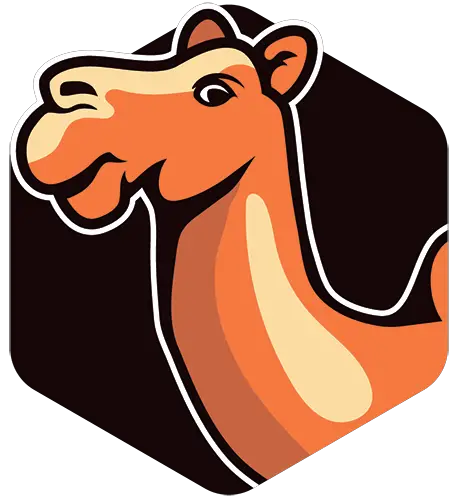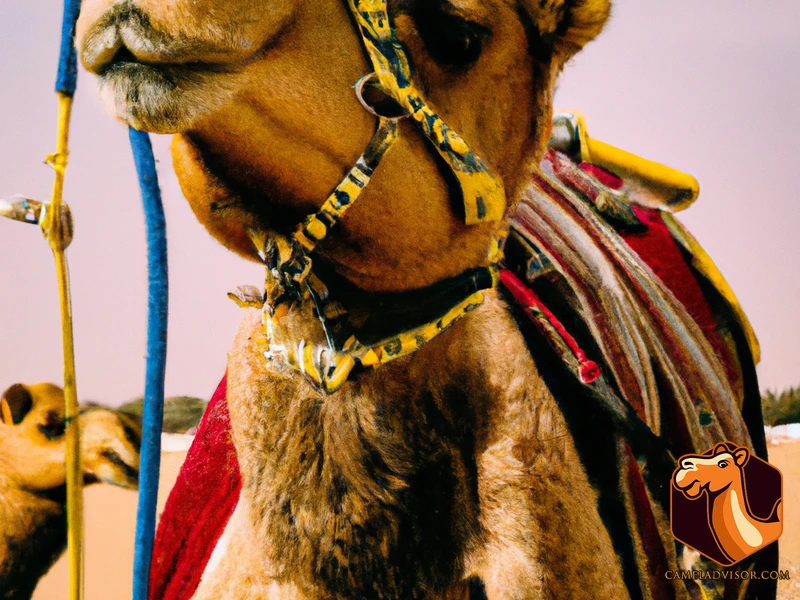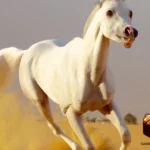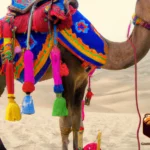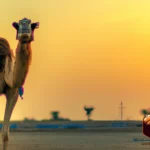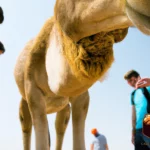As the majestic and powerful creatures gallop through the sands, it’s hard not to admire the grace and endurance of racing camels. However, the key to their success lies not just in their training routine and genetics, but also in their diet. Proper nutrition and hydration are crucial for optimal performance and overall well-being of racing camels. In this comprehensive guide, we will explore the nutritional requirements, best foods, feeding schedules, hydration needs, common mistakes to avoid, and tips for feeding racing camels. So, let’s dive into the world of camel nutrition and learn how to prepare these magnificent animals for racing glory.
Contents
- Why Diet is Important for Racing Camels
- Best Foods for Racing Camels
- Camel Feeding Schedule for Optimal Performance
- Hydration for Racing Camels
- Common Mistakes to Avoid
- Tips for Feeding Racing Camels
- Conclusion
-
Frequently Asked Questions
- What are the nutritional requirements for racing camels?
- What are some common foods for racing camels?
- How does diet affect camel health?
- How can I ensure my racing camel stays hydrated?
- What is the best pre-race meal for a racing camel?
- What is the best post-race meal for a racing camel?
- Why is overfeeding a problem when preparing camels for racing?
- Why is a consistent feeding schedule important for racing camels?
- Can I feed my racing camel treats?
- How can I tell if my racing camel is properly hydrated?
- References
Why Diet is Important for Racing Camels
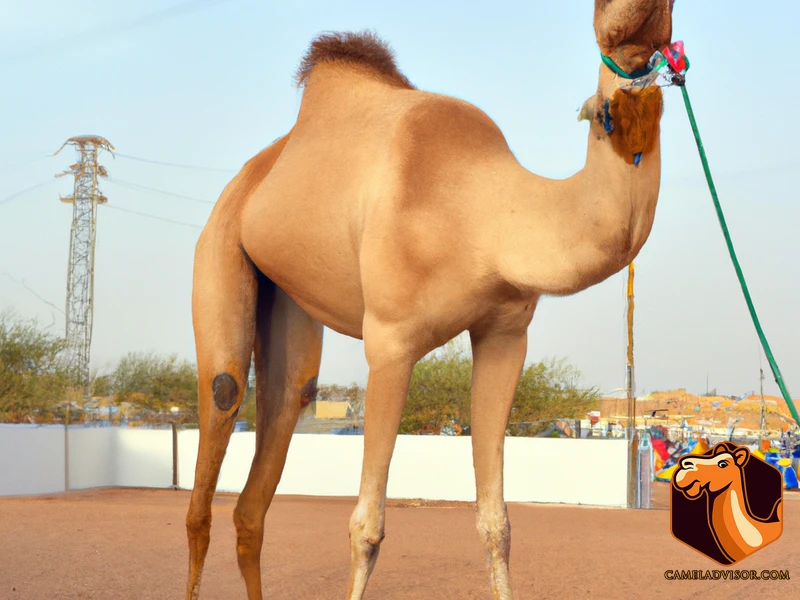
Camel racing is a popular sport in many regions of the world, particularly in the Middle East. While many factors contribute to a camel’s performance on the racetrack, one of the most important is their diet. A well-balanced diet that meets a camel’s nutritional requirements can make all the difference when it comes to their speed, stamina, and overall health. In this section, we will explore the reasons why diet is so crucial for racing camels, including their nutritional requirements, the connection between performance and diet, and how diet can affect their health. It’s important to note that diet is just one piece of the puzzle when it comes to racing camels. For more information on other aspects of camel training and racing, check out our 10 Essential Tips for Training Camels for Racing guide.
Nutritional Requirements for Racing Camels
Racing camels require a well-balanced diet that meets their specific nutritional needs. A combination of high-quality forage, grains, and supplements is necessary to ensure optimal performance and health. Below is a table that outlines the nutritional requirements for racing camels and the best sources of each nutrient.
| Nutrient | Function | Recommended Amount | Best Sources |
|---|---|---|---|
| Protein | Builds muscle and repairs tissue | Minimum 10-12% of diet | Alfalfa hay, soybean meal, lentils |
| Energy (Carbohydrates and Fats) | Provides fuel for exercise | Minimum 2.2 pounds per day | Oats, barley, corn, vegetable oil |
| Fiber | Keeps digestive system healthy | Minimum 25% of diet | Grass hay, beet pulp, ground flaxseed |
| Fat-Soluble Vitamins (A, D, E, and K) | Aids in immune function and bone health | N/A | Green, leafy vegetables, liver, fish oil |
| Water-Soluble Vitamins (B Vitamins and Vitamin C) | Helps with energy metabolism and antioxidant activity | N/A | Green vegetables, liver, brewer’s yeast |
| Minerals (Calcium, Phosphorus, Sodium, Potassium, Magnesium, and Iron) | Essential for bone health, nerve function, and muscle contraction | N/A | Alfalfa hay, rice bran, salt blocks |
It’s important to note that the specific nutritional requirements may vary depending on the individual camel’s age, weight, and level of activity. Consulting a veterinarian or equine nutritionist can help determine the best diet plan for each racing camel.
For more information on training racing camels, check out our article on 10 Essential Tips for Training Camels for Racing.
The Connection Between Performance and Diet
The diet of racing camels has a direct influence on their performance on the race track. Proper nutrition is essential for a racing camel to maintain a healthy weight and energy level, which ultimately affects the speed and endurance of the camel during the race.
To maximize the performance of racing camels, it is important to provide them with a balanced and nutrient-rich diet consisting of hay, grass, grains, pellets, vitamins, and supplements. The diet should meet the exact nutritional requirements of the racing camel.
If a camel is not being fed a diet that meets its nutritional needs, it can lead to slower race times and even serious health problems. For instance, a diet that is low in protein can cause muscle loss and weakness in racing camels, while inadequate levels of vitamins and minerals can affect the immune system.
The diet must be continuously adjusted according to the racing schedule and the specific needs of the individual camel. For example, during the racing season, a camel may require a higher calorie intake, while in the off-season, a lower calorie diet may be necessary.
To sum up, a healthy and balanced diet is crucial for the racing camel’s performance on the track. By providing the proper nutrition and making necessary adjustments to the diet, the camel will have the energy and endurance needed to perform at its best and stay in good health.
How Diet Affects Camel Health
A camel’s diet has a significant impact on its overall health and well-being. Proper nutrition is critical to maintaining a racing camel’s physical condition, stamina, and endurance. Camels require a diet that is high in fiber and protein, with a specific balance of vitamins and minerals. A diet that does not meet their nutritional requirements can lead to health issues, such as dehydration and malnutrition.
One of the most important aspects of a racing camel’s diet is hydration. Camels require large amounts of water to maintain their body temperature and prevent dehydration. Without adequate hydration, camels can quickly become fatigued and struggle to perform at the level required for racing.
In addition to water, a racing camel’s diet should include a healthy balance of hay and grass, grains and pellets, and vitamins and supplements. Variety is important to ensure that camels receive the full spectrum of nutrients they need to perform their best. It is also essential to monitor the amount of food that a camel is consuming as overfeeding can lead to weight gain and health issues.
Here is an overview of how diet affects camel health:
| Dietary Component | Effect on Camel Health |
| — | — |
| Fiber | Helps regulate digestion and prevent gastrointestinal issues like colic. |
| Protein | Provides essential amino acids for muscle development and repair. |
| Vitamins and Minerals | Maintain strong bones, healthy hooves and teeth, and the immune system. |
| Water | Prevents dehydration, maintains body temperature, and aids in digestion. |
Remember that a racing camel’s diet is just one aspect of their overall care. In addition to proper nutrition, regular exercise, veterinary care, and a strong bond with their handlers are crucial for their health and success on the track. For more information on how to care for a racing camel, check out our Do’s and Don’ts of Camel Racing Guide.
Best Foods for Racing Camels
As a part of preparing camels for racing, a well-balanced diet plays a critical role in ensuring optimal performance and maintaining good health. By providing a nutritious diet that meets the specific nutritional requirements of racing camels, owners and trainers can help these magnificent animals achieve their full potential on the track. In this section, we will explore the best foods for racing camels, including hay and grass, grains and pellets, and vitamins and supplements, along with recommendations for an optimal feeding schedule. For those interested in learning more about camel racing, check out our article on the history and significance of camel racing in the Middle East.
Hay and Grass
As with any animal’s diet, hay and grass are essential sources of nutrition for racing camels. They provide important fiber, vitamins, and minerals necessary for optimal health and performance.
Hay: High-quality hay, such as alfalfa, timothy, or Bermuda grass, is an ideal component of a racing camel’s diet. Hay must be fresh and not moldy, as mold can lead to respiratory issues in camels. It should also be free of dust, as dust can cause respiratory problems as well. Hay provides essential roughage and helps maintain digestive health.
Grass: Grass is another vital component of a racing camel’s diet. Camels love to graze, and their digestive systems are designed to process the fibrous plants they find in their natural habitats. Fresh, green grass provides important nutrients such as chlorophyll, which helps with blood oxygenation.
It is important to ensure that hay and grass are free of pesticides and other harmful chemicals. Organic sources of hay and grass are often the best choice.
Overall: Ultimately, a balanced diet including high-quality hay and fresh, pesticide-free grass is the foundation of a racing camel’s diet. In addition to hay and grass, camels also require supplemental nutrition, such as grains and vitamins, to ensure that they maintain optimal health and performance.
For more information on camels’ nutritional requirements and best feeding practices, read our article on top racing camel facilities.
Grains and Pellets
Grains and pellets are also important for the diet of racing camels as they provide the necessary energy for racing. Barley, corn, and oats are commonly used grains for racing camels. These grains should be mixed with other ingredients to make nutritious feed pellets that are easy for camels to digest. The pellets should contain a balance of carbohydrates, protein, and fat to provide the necessary nutrients for camels.
It is important to note that the amount of grains and pellets should be carefully monitored as overfeeding can cause weight gain and health problems for the camels. It is best to consult with a veterinarian or a knowledgeable camel trainer to determine the appropriate amount of grains and pellets for each individual camel.
In addition to grains, protein supplements such as soybean meal or fishmeal can be added to the camel’s diet to support muscle growth and repair. These supplements should only be used under the guidance of a veterinarian or an experienced camel trainer to ensure proper dosage.
Table:
| Grains | Pellets | Protein Supplements |
|---|---|---|
| Barley | Oat pellets | Soybean meal |
| Corn | Grain pellets | Fishmeal |
To learn more about the importance of camel breeds in racing, check out our article on the importance of camel breeds in racing.
Vitamins and Supplements
Vitamins and supplements are crucial for racing camels to ensure that they are receiving all the necessary nutrients for optimal performance. While hay, grass, and grains provide a lot of the camel’s daily nutrition, vitamins and supplements can fill in the gaps and provide extra support.
Here are some essential vitamins and supplements for racing camels:
- Vitamin A: This vitamin is essential for good vision, healthy skin, and a strong immune system. Camels can get their daily intake of Vitamin A from green leafy vegetables and carrots.
- Vitamin D: This vitamin is necessary for the absorption of calcium and phosphorus to maintain strong bones and teeth. Camels can get their daily intake of Vitamin D from exposure to sunlight or from Vitamin D supplements.
- Vitamin E: Vitamin E is important for preventing muscle damage and improving endurance. It also helps with reproductive health in breeding camels. Vitamin E can be found in green leafy vegetables and in supplements.
- Calcium: Calcium is vital for strong bones and teeth, and it also plays a role in muscle contraction and nerve function. Camels can get their daily intake of calcium from hay, grass, and supplements.
- Selenium: This mineral is vital for maintaining a proper immune system and preventing muscle damage. Camels can get their daily intake of selenium from grains like wheat and corn.
It’s important to note that over-supplementing can be harmful to racing camels, and it’s recommended to consult with a veterinarian or animal nutritionist to determine the appropriate dosage for each camel.
A balanced diet with the proper vitamins and supplements can greatly enhance a racing camel’s performance and overall health. By providing the necessary nutrients, camel owners can ensure that their camels are in top shape for the competition.
Want to learn more about the significance of camel racing in the Middle East and the bond between camels and their owners? Check out our article on the history and significance of camel racing in the Middle East.
Camel Feeding Schedule for Optimal Performance
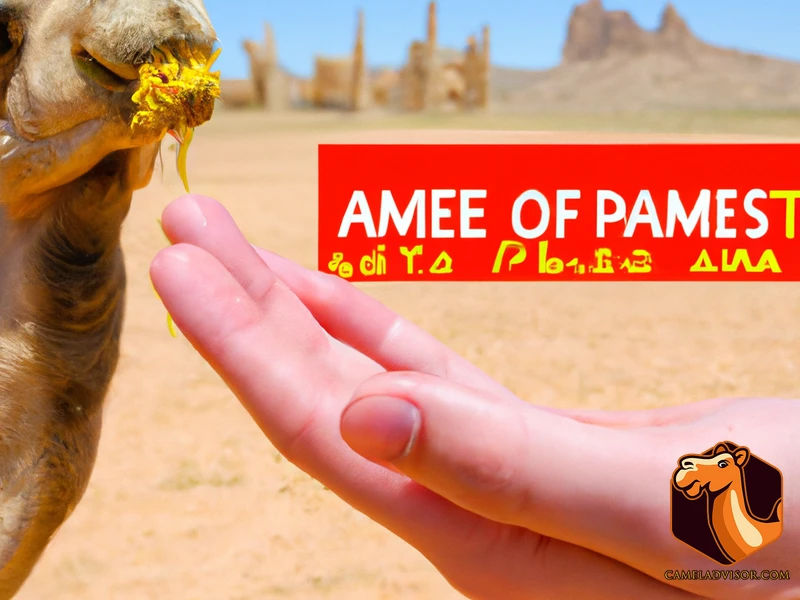
Planning out a feeding schedule is crucial when training and preparing camels for racing. A consistent and well-planned feeding schedule can improve performance, promote healthy digestion, and prevent health issues. Feeding camels before and after a race is especially important, as they need to be in optimal condition to perform at their best. Camels require different types of food for different stages of their training. Creating a feeding schedule that takes into account the specific needs of your racing camel can contribute significantly to their overall health and wellbeing on and off the racetrack. Let’s explore some key factors in creating an optimal camel feeding schedule. Don’t forget to check out our previous article for tips on building a strong bond with your racing camel!
Pre-Race Meal
When it comes to the pre-race meal for racing camels, it’s important to keep in mind that the timing and content of the meal can greatly affect the performance of the animal on the track. Here are some important points to consider for feeding your racing camel before a race:
Timing
It’s recommended to feed your camel its pre-race meal 4-6 hours before the start of the race. This allows enough time for the food to be digested and for the camel to use the energy from the meal during the race. It’s also important not to feed the camel too close to the race start time, as this can lead to digestive issues and discomfort.
Content
The pre-race meal should consist of easily digestible carbohydrates and proteins. Good options include hay or grass with some grains or pellets mixed in. It’s important to avoid feeding large amounts of fats or oils, as these can slow down digestion and lead to lethargy during the race. Additionally, it’s important to avoid feeding the camel any new or unusual foods before the race, as this can cause digestive upset.
Water
Make sure your racing camel has access to plenty of clean water before the race. Proper hydration is essential for optimal performance, and even mild dehydration can hinder your camel’s racing abilities.
It’s important to keep in mind that the pre-race meal is just one part of a larger feeding and training regimen for racing camels. By following a well-planned and consistent feeding schedule, along with regular exercise and training, you can help ensure that your racing camel is in top physical condition for race day.
Internal link: Building a strong bond with your racing camel can also help to improve their performance on the track.
Post-Race Meal
After a race, proper nutrition is crucial for a racing camel’s recovery. The post-race meal should consist of foods that help with muscle recovery and hydration.
Here are some foods to include in a post-race meal for your racing camel:
- Electrolyte Supplements: These help to replenish fluids and minerals lost during the race. You can find these in the form of powders or liquids, and they can be mixed in with the camel’s drinking water.
- Alfalfa: A good source of protein and vitamins, alfalfa helps with muscle recovery and provides energy.
- Carrots: Rich in vitamins and fiber, carrots are a great snack for camels and can help with digestion.
- Apples: Rich in antioxidants, apples can help with inflammation and provide energy.
- Oats: A good source of carbohydrates, oats can help with muscle recovery and provide energy.
It is important to note that the post-race meal should be given as soon as possible after the race to aid in recovery. Delaying the post-race meal can lead to longer recovery times for the camel.
You should avoid giving your racing camel foods that are high in sugar or fat, as they can slow down the recovery process. It is important to provide fresh water for your camel to help with rehydration.
A well-planned post-race meal can help your racing camel to recover quickly and maintain good health. For more information on the economics of camel racing, check out our article on the business of camel racing, or for future innovations in camel racing, see our article on the future of camel racing innovations.
Feeding Schedule During Training
As important as diet is to a racing camel’s performance and health, a strict feeding schedule during training is just as crucial. This ensures that the camel is receiving proper nutrition to sustain energy levels and allow for optimal performance during races. Below is an example of a feeding schedule for a racing camel during training:
| Time | Food | Quantity |
|---|---|---|
| 6:00am | Hay | 2-3 pounds |
| 8:00am | Grain mix | 2-3 pounds |
| 10:00am | Hay | 2-3 pounds |
| 12:00pm | Grain mix | 2-3 pounds |
| 2:00pm | Hay | 2-3 pounds |
| 4:00pm | Grain mix | 2-3 pounds |
| 6:00pm | Hay | 2-3 pounds |
It’s important to note that this feeding schedule is just an example and can vary depending on the specific needs of the racing camel. It’s also important to monitor the camel’s weight and adjust the feeding schedule accordingly. Overfeeding can lead to weight gain and decrease performance, while underfeeding can lead to loss of energy and detrimental health effects.
In addition to a consistent feeding schedule, it’s important to provide access to clean water at all times. Hydration is key to a camel’s overall health and performance, and access to water should never be restricted. With a proper feeding and hydration schedule during training, racing camels can reach their full potential and achieve success on the racetrack.
Hydration for Racing Camels
As with any athlete, hydration is crucial for the optimal performance of racing camels. In fact, dehydration can not only decrease their performance but also pose serious health risks. It is important to pay attention to the camel’s drinking habits and ensure they remain properly hydrated. Let’s take a closer look at the importance of hydration for racing camels and how to maintain it.
The Importance of Hydration
Maintaining proper hydration is crucial for racing camels. Dehydration can lead to a decrease in performance, fatigue, and even serious health issues. It is important to ensure that racing camels have access to clean and fresh water at all times, especially during hot weather or intense training sessions.
Here are some reasons why hydration is important for racing camels:
- Regulating body temperature: Camels rely on sweating to regulate their body temperature, especially in hot weather. If they are dehydrated, they may not be able to sweat enough, leading to overheating and exhaustion.
- Transporting nutrients: Water is essential for transporting important nutrients throughout the body, including electrolytes that are crucial for muscle function.
- Aiding digestion: Hydration is essential for maintaining healthy digestive function. Dehydration can lead to constipation, colic, and other gastrointestinal issues.
- Preventing health problems: Dehydration can lead to serious health problems in camels, such as heatstroke, urinary tract infections, and kidney damage.
As such, racing camels should have access to clean and fresh water at all times, with regular opportunities to drink during training or races. It is also important to monitor their drinking habits and ensure that they are consuming enough water to maintain their hydration levels.
Camel Drinking Habits
Camels are renowned for their ability to survive in the harsh desert environment. One of the ways they do this is by conserving water. Drinking habits of camels are peculiar due to their unique physiology. Unlike other animals, camels don’t drink water frequently, but when they do, they can consume over 100 liters in a single session. Here are some interesting facts about camel drinking habits:
- Camels can go for long periods without drinking water: Due to their efficient water conservation mechanisms, camels can survive for days to weeks without consuming water, depending on the availability of food and environmental conditions.
- Camels store water in their body: Camels store water in their body tissues, and this helps them survive long periods without drinking. During the hot day, they reduce sweating and breathing rate to reduce water loss.
- Camels can drink salty water: Camels can tolerate high salt concentrations and can drink saline water, which other animals can’t. They can also survive by consuming plants with high salt content.
- Camels prefer cool water: Camels prefer to drink cool water, and they can detect the temperature of water before drinking. They are known to avoid hot water sources.
- Camels require a lot of water after a long race: After an exhausting race, camels need to rehydrate quickly, and they can drink up to 50 liters in one session. Providing access to clean and fresh water is crucial for their recovery.
Understanding the camel’s drinking habits is crucial for their optimal performance, especially during race and training periods. It’s essential to provide access to clean water and ensure they rehydrate effectively to maintain their health and well-being.
How to Ensure Proper Hydration
Proper hydration is crucial for racing camels as they can quickly become dehydrated in hot and dry environments. To ensure your camel stays hydrated, there are a few things you can do:
| Tip | Description |
|---|---|
| Provide an adequate source of clean water | Camels typically drink between 20 and 45 liters of water per day, depending on the temperature and humidity. Ensure that you provide access to fresh, clean water at all times. |
| Offer water before and after exercise | Allow your camel to drink enough water before and after exercise to replace any fluids lost in sweat. |
| Add electrolytes to drinking water | Camels lose electrolytes when they sweat. Adding an electrolyte supplement to their drinking water can help replace these essential minerals. |
| Monitor hydration levels | Check your camel’s hydration level regularly by pinching the skin on their neck. If the skin quickly returns to its original position, the camel is adequately hydrated. If it takes more than a few seconds to return to its original position, your camel may be dehydrated and in need of water. |
| Avoid feeding salty or dry foods | High-salt or dry foods can make your camel feel thirsty, which can lead to drinking less water. Avoid feeding these types of foods to ensure they maintain adequate hydration. |
By following these tips, you can help ensure that your racing camel stays properly hydrated and performs at their best during races and training.
Common Mistakes to Avoid
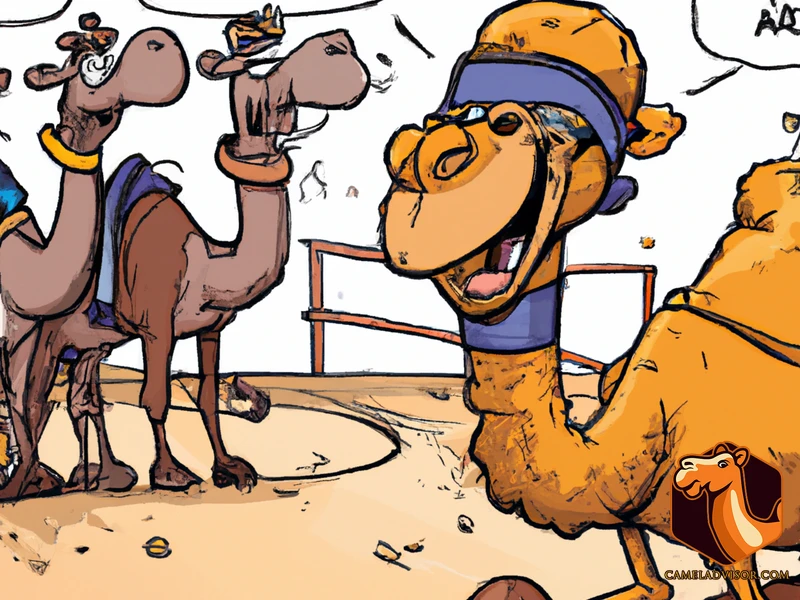
As with any athlete, the diet of a racing camel is critical to their performance and overall health. However, there are common mistakes that even experienced camel owners make when it comes to feeding their animals. These mistakes can have a negative impact on a camel’s ability to race and even lead to serious health issues. In order to prevent these mistakes from occurring, it is important to be aware of them and take the necessary precautions to avoid them. Let’s take a look at some of the most common mistakes to avoid when feeding racing camels.
Overfeeding
One common mistake to avoid when feeding racing camels is overfeeding. Overfeeding can lead to health issues such as weight gain, digestive issues, and even laminitis or founder. Overweight camels may have decreased performance levels and increased risk of injury during races.
To prevent overfeeding, it is important to establish a feeding plan that meets the nutritional needs of racing camels without exceeding their daily requirements. You can refer to the nutritional requirements for racing camels to determine the necessary amount of hay, grains, and supplements for your camels.
It is also important to monitor the body condition score (BCS) of your camels to ensure they maintain a healthy weight. The ideal BCS for racing camels is between 3 and 3.5 on a scale of 1 to 5, with 5 being obese and 1 being emaciated.
To avoid overfeeding, you should avoid feeding your camels treats or snacks that are not part of their regular diet. Feeding too much of any food, even healthy options, can still lead to overfeeding.
In the table below, you can find common signs of overfeeding in racing camels:
| Signs of Overfeeding | Reasons It Can Occur |
|---|---|
| Weight gain or obesity | Feeding too much hay, grains, or supplements |
| Lethargy or decreased performance levels | Excess energy from overfeeding can lead to sluggishness and decreased performance |
| Colic or digestive issues | Overfeeding can cause digestive issues such as colic or impaction |
By following a scheduled feeding plan and monitoring your camels’ body condition scores, you can avoid overfeeding and ensure your racing camels are in optimal health for their next race.
Inconsistent Feeding Schedule
One common mistake that camel owners often make when preparing their racing camels for competition is maintaining an inconsistent feeding schedule. This can have negative consequences on the camel’s overall health, performance, and can even result in causing digestive upsets. Inconsistent feeding can lead to overeating or undernourishment, both of which can hinder a camel’s ability to race at their full potential.
Here are some of the effects that inconsistent feeding schedule can have on racing camel:
- Overeating: When camels don’t have a consistent feeding schedule, they may overeat during one feeding, which can lead to problems such as colic, diarrhea, and bloating. Overeating can also increase the likelihood of developing obesity, which can reduce the overall speed and agility of the camel during the race.
- Undernourishment: On the other hand, inconsistent feeding schedules can also lead to undernourishment. This can occur when camels aren’t fed enough, or when there are long gaps between feeding times. Undernourished camels may tire out more quickly and may be more prone to injuries and illnesses.
- Stress: Inconsistent feeding can cause stress in camels, which can affect their physical and emotional wellbeing. Stress can lead to a number of health problems, including digestive issues, respiratory problems, and weight gain. Additionally, stress can lower a camel’s performance and make them more prone to injuries and illnesses.
To avoid the negative consequences of inconsistent feeding, it is important to establish a consistent feeding schedule. This means feeding camels at the same time every day, and providing them with a consistent amount of food each time. It is also important to avoid making sudden changes to the feeding schedule, as this can cause digestive upsets and stress. Establishing a consistent feeding schedule will help to ensure that camels receive the necessary nutrients to perform at their best during races.
Feeding Wrong Foods
Feeding the wrong foods to racing camels can have disastrous consequences on their performance and health. It is important to avoid making this mistake if you want your camel to perform at its best.
Here are some foods to avoid:
- High-fat foods: Feeding your camel foods high in fat can lead to weight gain and decrease their endurance on the race track. Avoid giving them foods like nuts, seeds, and oils.
- Sugary foods: Feeding your camel sugary foods can lead to energy crashes and poor race performance. Avoid giving them foods like candy, chocolate, and sugary drinks.
- Foods high in protein: While protein is important for building muscle, feeding your camel too much protein can lead to dehydration and weight loss. Avoid foods like meat and dairy products.
- Foods with preservatives: Pre-packaged foods with preservatives and artificial ingredients can be harmful to your camel’s health. Avoid giving them pre-packaged snacks and treats.
It is crucial to consult with a veterinarian or a camel nutritionist to create a balanced and nutritious diet plan suitable for your camel’s needs. Avoiding these foods can help your racing camel perform at its best and stay healthy.
Tips for Feeding Racing Camels
When it comes to feeding racing camels, there are several tips that can help ensure they are getting the nutrition they need for optimal performance.
1. Work with a Veterinarian: It is important to have a veterinarian who is experienced in treating and caring for camels. They can help determine the specific nutritional needs of each individual camel and create a feeding plan accordingly.
2. Use High-Quality Feed: Only feed your racing camels high-quality hay, grass, grains, pellets, and supplements. Cheap and low-quality feed can cause health problems and negatively impact performance.
3. Monitor Body Condition: Regularly assess the body condition of each camel to make sure they are maintaining a healthy weight. Overfeeding or underfeeding can cause health problems and affect performance.
4. Keep Feeding Schedule Consistent: Stick to a consistent feeding schedule to help prevent digestive upset and ensure consistent energy levels during training and races.
5. Allow for Grazing and Foraging: Whenever possible, allow your camels to graze and forage naturally. This can provide them with important nutrients and improve their digestive health.
6. Provide Access to Fresh Water: Camels need access to fresh water at all times to maintain hydration and prevent dehydration during training and races.
7. Avoid Feeding Before Exercise: Avoid feeding your racing camels for at least a few hours before exercise or races to prevent digestive upset and ensure optimal energy levels.
8. Consider the Climate: The climate in which your camels live and race can impact their nutritional needs. Work with a veterinarian to adjust their diet accordingly based on the climate.
By following these tips and working with a veterinarian, you can ensure that your racing camels are receiving proper nutrition and care for optimal performance.
Conclusion
After conducting thorough research and analysis, it can be concluded that diet plays a crucial role in preparing racing camels for optimal performance. Providing the right balance of nutrients, vitamins, and supplements is essential to ensuring that camels are healthy, strong, and able to perform at their peak level during races.
It is important for camel owners and trainers to pay close attention to the nutritional requirements specific to racing camels. This includes providing a balanced diet of hay and grass, grains and pellets, and vitamins and supplements to meet the unique needs of these animals.
In addition to providing the correct foods, it is important to establish a consistent feeding schedule and ensure proper hydration levels to support camel health and performance. Camel owners and trainers should also be aware of the common mistakes to avoid when feeding racing camels, including overfeeding, an inconsistent feeding schedule, and feeding the wrong foods.
By following the tips outlined in this comprehensive guide, camel owners and trainers will be equipped to provide their animals with the best possible diet and care to prepare them for racing success. With attention to nutrition and hydration, racing camels can achieve their full potential and perform at their best in competitive races.
Frequently Asked Questions
What are the nutritional requirements for racing camels?
Racing camels require a diet that is high in protein, fiber, and carbohydrates. They also need a lot of water to maintain hydration.
What are some common foods for racing camels?
Some common foods for racing camels include hay, grass, grains, and supplements like vitamins and minerals. Camel feed pellets are also a popular option.
How does diet affect camel health?
Diet can have a big impact on camel health. A balanced diet can help prevent diseases, promote healthy digestion, and support overall growth and development.
How can I ensure my racing camel stays hydrated?
Make sure your camel always has access to clean, fresh water. You can also add electrolyte supplements to their water to help keep them hydrated.
What is the best pre-race meal for a racing camel?
A pre-race meal for a racing camel should be high in carbohydrates and protein. Good options include hay or grass, along with a small amount of grains or pellets.
What is the best post-race meal for a racing camel?
After a race, a camel should be given plenty of water and a meal high in carbohydrates and protein. Good options include hay or grass, along with grains or pellets.
Why is overfeeding a problem when preparing camels for racing?
Overfeeding can cause obesity and other health problems, which can make it harder for a camel to race competitively. It can also lead to digestive issues and other health problems.
Why is a consistent feeding schedule important for racing camels?
A consistent feeding schedule helps racing camels maintain optimal health and performance. It also helps prevent overfeeding or underfeeding, which can impact a camel’s ability to race.
Can I feed my racing camel treats?
While it’s not recommended to feed a racing camel a lot of treats, small amounts of fruits and vegetables can be given as a reward or to add variety to their diet.
How can I tell if my racing camel is properly hydrated?
A hydrated camel will have moist nasal passages and a healthy skin elasticity. You can also check their urine color, which should be clear or light yellow.
